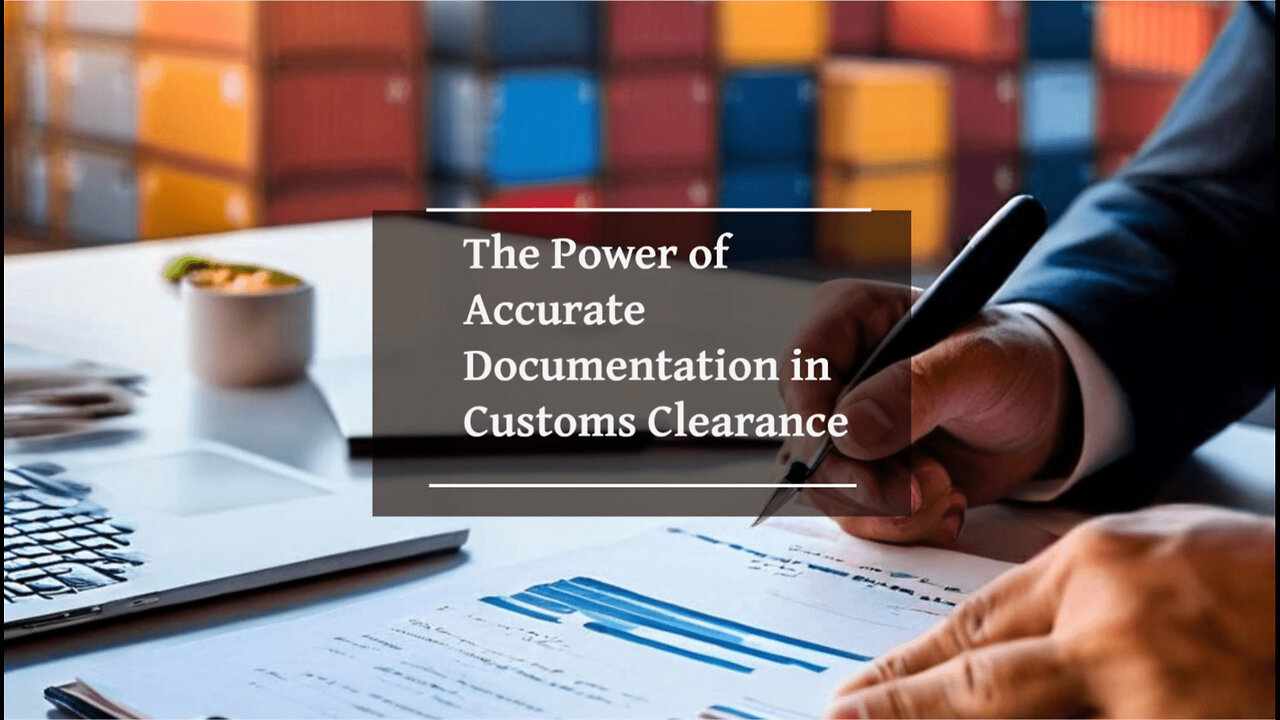Premium Only Content

Unlocking Smooth Customs Clearance: The Power of Accurate Documentation
ISF Solution | (832-904-9333)
clearance@isfsolution.com | www.isfsolution.com
In today's video, we discussed the crucial role of accurate documentation in the customs clearance process. We explored various reasons why accurate documentation is essential, including compliance with customs regulations, risk management, efficient supply chain management, accurate duty and tax calculations, and maintaining a company's reputation.
Compliance with customs regulations is a fundamental requirement when goods cross international borders. Accurate documentation ensures that goods are classified correctly and all necessary permits, licenses, and certificates are in order. This compliance helps avoid delays and penalties during customs clearance. Accurate documentation also plays a crucial role in risk management, as customs authorities rely on these documents to assess potential risks associated with the goods being imported or exported. By providing detailed information about the goods, customs officials can analyze and mitigate risks such as smuggling or the entry of prohibited items.
Efficient supply chain management is heavily reliant on accurate documentation. Inaccurate or incomplete documentation can lead to delays, redirect shipments to incorrect destinations, or result in goods being held in customs. Accurate documentation ensures that the right goods are delivered to the right place at the right time, reducing operational disruptions and improving overall supply chain efficiency.
Accurate documentation is also essential for calculating and minimizing duties and taxes incurred during customs clearance. The value of the goods, as stated in the documentation, directly impacts the amount of duties and taxes levied. Inaccurate or undervalued documentation could result in higher customs duties, penalties for non-compliance, and legal consequences. On the other hand, accurate documentation can lead to significant cost savings, helping importers remain competitive in the global market.
Maintaining a company's reputation is crucial in international trade. Customs authorities worldwide have sophisticated systems to exchange information, and inaccurate or inconsistent documentation can create a negative impression and lead to scrutiny or audits. By ensuring accurate documentation, importers and customs brokers demonstrate their commitment to compliance, professionalism, and integrity, enhancing their credibility in the eyes of customs authorities and trading partners.
In conclusion, accurate documentation is of utmost importance in the customs clearance process. It ensures compliance with customs regulations, manages risks, facilitates efficient supply chain management, enables accurate duty and tax calculations, and safeguards a company's reputation. Importers and customs brokers should prioritize proper documentation practices to avoid delays, penalties, and reputational damage. Thank you for watching, and we hope you found this discussion valuable. Don't forget to subscribe to our channel for more informative videos related to customs brokerage.
#usimportbond
#isfcustomsbroker
#uscustomsclearing
#isfentry
Video Disclaimer Here: For educational purposes - No affiliation with US government sectors.
0:31 - Compliance: Accurate documentation is crucial for customs clearance to comply with specific regulations of importing and exporting countries, ensuring correct classification of goods and having necessary permits like customs bonds.
1:07 - Risk Management: Customs authorities use accurate documentation to assess risks associated with imported or exported goods, providing detailed information to mitigate risks like smuggling, terrorism, or prohibited items entry.
1:40 - Supply Chain Efficiency: Accurate documentation ensures the right goods reach the right place at the right time, preventing delays, redirections, or customs holds, enhancing supply chain efficiency.
2:10 - Cost Savings: Accurate documentation helps in precise calculation of duties and taxes, reducing financial implications like higher customs duties, penalties, and legal consequences, ultimately leading to cost savings and competitiveness.
3:05 - Reputation Management: Maintaining accurate documentation showcases professionalism, commitment to compliance, and integrity, enhancing credibility with customs authorities and trading partners, safeguarding a company's reputation in international trade.
-
 1:28:42
1:28:42
Redacted News
5 hours agoBREAKING! SOMETHING BIG IS HAPPENING IN EUROPE ALL OUT WAR IS COMING AGAINST RUSSIA, TRUMP FURIOUS
108K263 -
 47:50
47:50
Candace Show Podcast
6 hours agoBREAKING: Judge Makes Statement Regarding Taylor Swift's Text Messages. | Candace Ep 155
94.3K105 -
 DVR
DVR
Josh Pate's College Football Show
3 hours ago $0.29 earnedCFB’s Most Hated Teams | FSU & Clemson Future | Big Ten Win Totals | Star Rankings Overrated?
5.76K -
 1:33:47
1:33:47
CatfishedOnline
4 hours agoGoing Live With Robert - Weekly Recap
27.8K -
 55:18
55:18
LFA TV
1 day agoEurope’s Sudden Turn Against America | TRUMPET DAILY 3.6.25 7PM
32.2K3 -
 4:21
4:21
Tundra Tactical
4 hours ago $1.38 earnedPam Bondi MUST Enforce Due Process NOW!
18.4K1 -
 56:42
56:42
VSiNLive
5 hours agoFollow the Money with Mitch Moss & Pauly Howard | Hour 1
43.6K1 -
 1:05:32
1:05:32
In The Litter Box w/ Jewels & Catturd
1 day agoShalom Hamas | In the Litter Box w/ Jewels & Catturd – Ep. 756 – 3/6/2025
98.7K37 -
 1:23:00
1:23:00
Sean Unpaved
7 hours ago $2.98 earnedNFL Free Agency
50.9K3 -
 18:25
18:25
Stephen Gardner
6 hours ago🔥The REAL REASON the Epstein Files are being HIDDEN | I CONFRONT Alan Dershowitz for details!
63.3K110